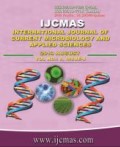


 National Academy of Agricultural Sciences (NAAS)
National Academy of Agricultural Sciences (NAAS)

|
PRINT ISSN : 2319-7692
Online ISSN : 2319-7706 Issues : 12 per year Publisher : Excellent Publishers Email : editorijcmas@gmail.com / submit@ijcmas.com Editor-in-chief: Dr.M.Prakash Index Copernicus ICV 2018: 95.39 NAAS RATING 2020: 5.38 |
Various methods are used to manage phytonematodes under field conditions. Use of chemicals to manage phytonematodes in various crops is very popular among farmers. But these chemicals are not ecofriendly. Various bio-control agents are found promising against root-knot nematodes. Therefore to study the effect of different bio-agents for the management of Meloidogyne spp. in papaya nursery, application of Pseudomonas putida, P. fluorescens, Bacillus amyloliquefaciens, B. pumilus, B. subtilis, B. megaterium and Purpureocillium lilacinum each @ 50g/m2 were tested in nursery having initial nematode population of 293 J2/200 cm3 soil. During experiment we have taken different observations viz., number of females, number of egg mass/3 g roots and number of eggs/egg mass and transplantable seedlings of papaya.
 |
 |
 |
 |
 |